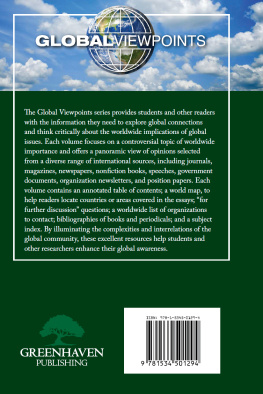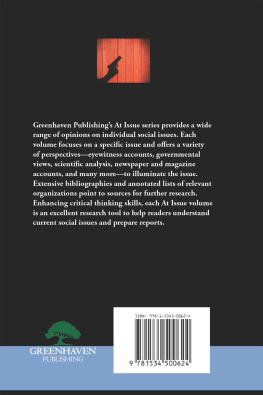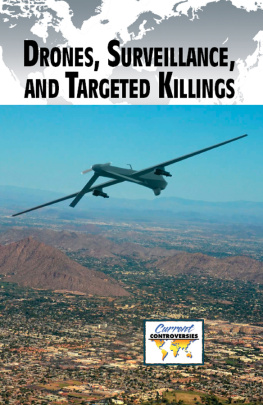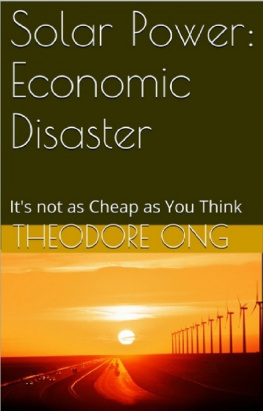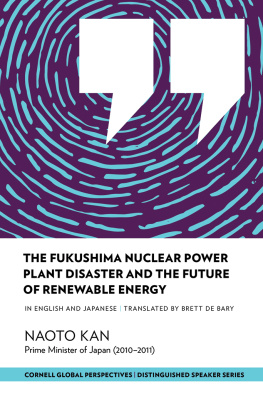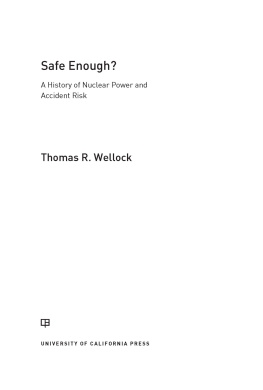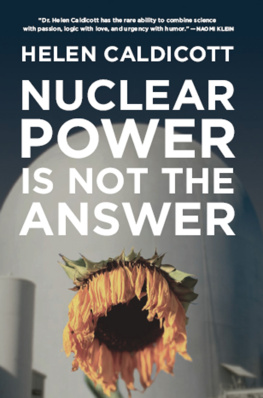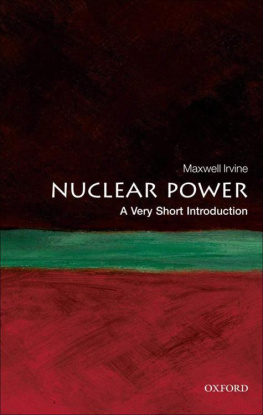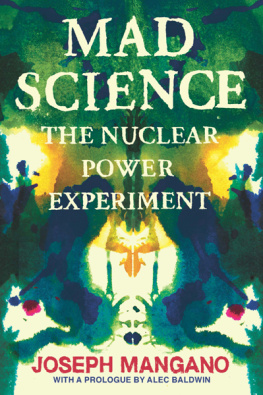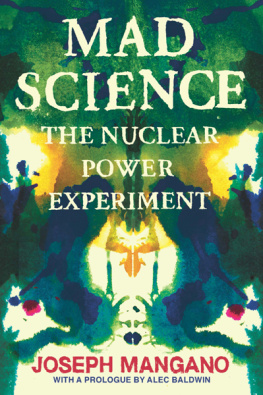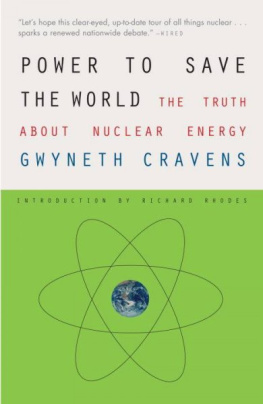Revisiting
Nuclear Power
Other Books of Related Interest
At Issue Series
Nuclear and Toxic Waste
The US Energy Grid
Current Controversies Series
Nuclear Energy
Oil
Introducing Issues with Opposing Viewpoints Series
Energy Alternatives
Nuclear Power
Oil
Issues That Concern You Series
Alternate Energy
Nuclear Power
Opposing Viewpoints Series
Energy Alternatives
Global Resources
Nuclear Power
Revisiting
Nuclear Power
Anne Cunningham, Book Editor
Published in 2018 by Greenhaven Publishing, LLC
353 3rd Avenue, Suite 255, New York, NY 10010
Copyright 2018 by Greenhaven Publishing, LLC
First Edition
All rights reserved. No part of this book may be reproduced in any form without permission in writing from the publisher, except by a reviewer.
Articles in Greenhaven Publishing anthologies are often edited for length to meet page requirements. In addition, original titles of these works are changed to clearly present the main thesis and to explicitly indicate the authors opinion. Every effort is made to ensure that Greenhaven Publishing accurately reflects the original intent of the authors. Every effort has been made to trace the owners of the copyrighted material.
Cover image: Miguel Villagran/Getty Images
Map: frees/Shutterstock.com
Library of Congress Cataloging-in-Publication Data
t/k
Manufactured in the United States of America
Website: http://greenhavenpublishing.com
Contents
Foreword
Introduction
Chapter 1: Nuclear Power Around the World
1. In Japan, Trust Has Been Lost
Tatsujiro Suzuki
After a devastating disaster at Japans Fukushima Daiichi Nuclear Power Plant in 2011, the Japanese people no longer have faith in the potential of nuclear power.
2. In Iraq, Nuclear Weapons Have a Dangerous History
Nuclear Threat Initiative
Saddam Hussein may have sought nuclear weapons for Iraq, but US claims that he had these weapons of mass destruction proved false. Since Saddams fall, Iraq has cooperated with nonproliferation efforts.
3. In North Korea, Nuclear Weapons Are the Key to Security
Zack Beauchamp
Since 1993, North Korea has committed to developing nuclear weapons. Despite numerous negotiations, North Korea sees military strength as the only sure path to national security.
4. In Iran, Nuclear Ambitions Are Cause for International Concern
David Albright and Andrea Stricker
Iran has long viewed nuclear weapons as essential to national security. In response to accelerated nuclear efforts in the 1980s, the international community has worked to curtail Irans nuclear program, but the 2015 deal with the United States has been criticized for being too lenient in this regard.
5. Why We Should Pursue Nuclear Power
Ernest Moniz
Nuclear power should be part of the global energy future. Though nuclear power is potentially clean, reliable, and inexpensive, new plants require high investment, while safety, waste disposal, and weapons proliferation present additional challenges.
6. The Drawbacks of Nuclear Power
Mark Diesendorf
Mining of scarce uranium ore is carbon intensive enough to potentially offset any net emission benefits of nuclear power. Given the many other downsides of nuclear power, such as waste disposal challenges and possible weapons proliferation, it is too risky overall.
Chapter 2: Exploring the Politics of Nuclear Energy
1. History and Creation of Nuclear Energy
Energy Future
Scientists in the late nineteenth century discovered the tremendous energy potential within the atom. World War II accelerated this research, culminating in the first nuclear weapon. Since then, peaceful nuclear energy has largely benefitted the world, despite major accidents and other setbacks.
2. In Japan, a Troubled Nuclear Legacy
Peter Kuznick
As the only country to suffer a nuclear attack, Japan is fiercely anti-nuclear. Under the US-led Atoms for Peace program, Japan pursued nuclear power, but the Fukushima accident may end the era of nuclear energy in Japan.
3. Flaws in the Nuclear Non-Proliferation Treaty (NPT)
Linda Gunter
Since the 1970s, the Nuclear Non-Proliferation Treaty has provided assistance with civilian nuclear energy for nations that pledge not to pursue weapons. Non-signatory nations, such as India, have both nuclear weapons and energy, creating a major loophole in the treaty.
4. Disparity Between Nuclear and Non-nuclear Nations Impedes NPT
Lawrence Wittner
The United States and former Soviet Union created the Nuclear Non-Proliferation Treaty in 1965 to prevent the spread of nuclear weapons. Non-nuclear nations felt this created a two-tiered system enabling the five nuclear-armed nations to maintain their supremacy.
5. The Comprehensive Nuclear Test Ban Treaty: Then and Now
Mary Beth Nikitin
Banning nuclear tests is the oldest item on the arms control agenda. Nonetheless, unanimous support for a total ban on any further nuclear tests or explosions has remained elusive.
Chapter 3: Nuclear Safety and Security: Critical Issues
1. Nuclear Power Plants Are Vulnerable Targets
Karl Grossman
There has never been an attack on a nuclear power plant to date, but it could happen. Power plants are in vulnerable, open locations, and their proximity to population centers is cause for concern.
2. Nuclear Power Provides Safe, Reliable, and Clean Energy
Thomas J. Eiden
Nuclear power is clean and safe, but opponents are deceiving the public about its dangers and lobbying for overly restrictive legislation.
3. In Japan, Fukushima Proved Nuclear Power to Be Safer than People Thought
Kelvin Kemm
The Fukushima meltdown in Japan caused zero fatalities and did little lasting damage. According to the author, this is concrete evidence that nuclear power is safe, even in worst-case scenarios.
4. In Japan, Nuclear Opponents Exploit Fukushima Accident in Spite of Evidence
Willem Post
Opponents of nuclear energy may overstate the damage caused by Fukushima to promote renewable energy, according to the author. Death rates would have been higher had coal been used to provide Japan with the energy equivalent to nuclear power.
5. Studies Underestimate the Risks of Nuclear Power
Jan Bernek
A leading study showing that nuclear power is safe relative to fossil fuels relies on skewed data, such as excluding Chernobyl. Correcting for this irregularity yields a more accurate picture.
Chapter 4: Is Nuclear Power a Viable Option for the Future?
1. Nuclear and Renewable Energy Provide Clean Electricity
Environmental and Energy Study Institute
Fossil fuels are driving destructive climate change. Comparatively low emitting power sources such as nuclear and renewable energy are ways to address this problem while meeting our energy demands.
2. In Malaysia, a Warning About the Many Disadvantages Nuclear Power Has

